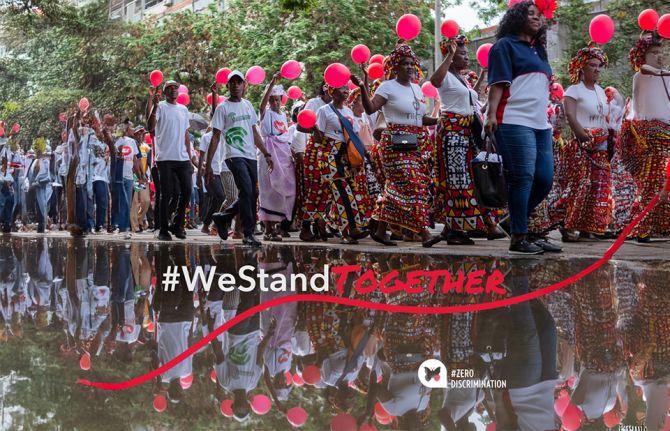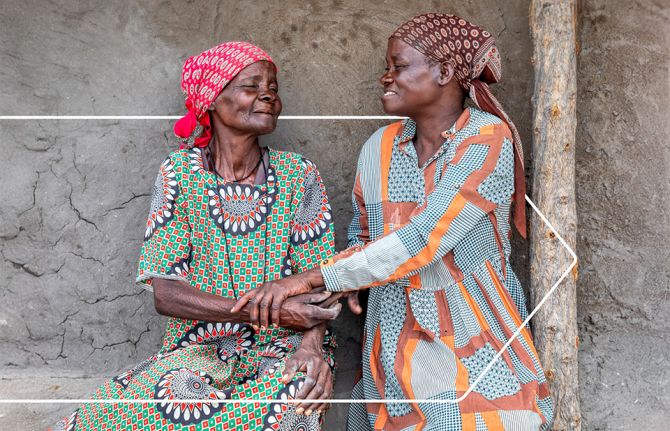UNDP The United Nations Development Programme

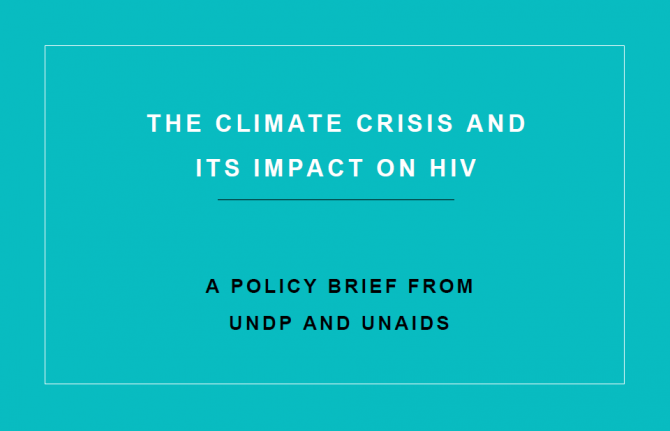
Press Release
Climate emergency risks worsening AIDS epidemic, UN warns at COP29
21 November 2024 21 November 2024Countries facing “triple funding crisis” of insufficient climate finance, insufficient HIV funding, and crippling debt
GENEVA/BAKU, 21 November 2024—The climate crisis could disrupt HIV services and lead to increasing HIV risk for some of the most vulnerable populations, the Joint United Nations Programme on HIV/AIDS (UNAIDS) and United Nations Development Programme (UNDP) have warned at the COP29 Climate Conference in Baku, Azerbaijan.
In a new report, the UN agencies warn that eroded public health infrastructure, heightened prevalence of diseases that interact with HIV, food insecurity, water scarcity, and the mass displacement of people – all likely to intensify due to climate change – could drive new HIV infections and lead to more AIDS-related deaths.
“The progress we have made tackling AIDS is fragile – and it could be unwound by runaway climate change,” said Winnie Byanyima, Executive Director of UNAIDS. “Some of the most climate vulnerable countries also have the highest HIV burden, and are the countries in the greatest debt, compounding injustice on injustice. We need to find ways to ease the triple funding crisis of AIDS, climate, and debt, and invest in the communities on the front lines of these intertwined crises.”
Many of the countries at the sharp end of climate change are also facing the worst impacts of the AIDS epidemic, and climate change is likely to exacerbate the inequalities of AIDS, UNAIDS says. Of the 4,000 adolescent girls and young women aged between 15 and 24 years newly infected with HIV every week, 3,100 live in Sub-Saharan Africa, where severe heatwaves and drought could leave whole regions uninhabitable.
HIV-focused institutions are responding, with 70% of financing from the Global Fund to Fight HIV, Tuberculosis and Malaria set to go to 50 of the most climate-vulnerable countries. But many of these countries are facing a triple funding crisis, with insufficient climate finance, a US$ 9.5billion gap in HIV funding, and the crushing burden of sovereign debt.
Almost half of humanity live in countries spending more on servicing debt than on healthcare. In Western and Central Africa, countries are spending seven times more on repaying debt than on health. With 71% of public climate financing coming as loans rather than grants, the climate crisis will only make this problem worse.
Last year, Malawi was hit by Cyclone Freddy amid a cholera outbreak just as the nation was recovering from COVID-19. Some of the worst hit regions were those with the highest burden of HIV. Around 37 000 people living with HIV were displaced by the storm, forced to navigate overwhelmed services and shortages of medicines – and this is just one of many examples of how climate change is already impacting the HIV response.
At the report launch on the sidelines of the COP29 Climate Conference in Baku, governments will be urged to tackle inequalities, build proper leadership and governance systems, and provide sustainable financing to prevent a climate-induced AIDS crisis.
“At COP29 we can see increasing recognition that the climate crisis is compounding existing health challenges” said Marcos Neto, Director, Bureau of Policy & Programme Support, UNDP. “The AIDS response has shown us what is possible when communities most impacted, governments and institutions unite. By embedding HIV and health considerations into climate action, we can protect hard-won progress, build resilience for the future, and leave no one behind.”
Notes
On Thursday 21 November, UNAIDS and UNDP are hosting a discussion on HIV and climate change at COP29 in Baku, Azerbaijan at the Azerbaijan Pavillion from 14:00-15:00 AZT.
The Climate Crisis and HIV: A Policy Brief from UNDP and UNAIDS is available here.
UNDP
UNDP is the leading United Nations organization fighting to end the injustice of poverty, inequality, and climate change. Working with our broad network of experts and partners in 170 countries, we help nations to build integrated, lasting solutions for people and planet. Learn more at undp.org or follow at @UNDP.
UNAIDS
The Joint United Nations Programme on HIV/AIDS (UNAIDS) leads and inspires the world to achieve its shared vision of zero new HIV infections, zero discrimination and zero AIDS-related deaths. UNAIDS unites the efforts of 11 UN organizations—UNHCR, UNICEF, WFP, UNDP, UNFPA, UNODC, UN Women, ILO, UNESCO, WHO and the World Bank—and works closely with global and national partners towards ending the AIDS epidemic by 2030 as part of the Sustainable Development Goals. Learn more at unaids.org and connect with us on Facebook, Twitter, Instagram and YouTube.
Documents
Preventing and responding to an HIV-related human rights crisis — Guidance for United Nations agencies and programmes
25 April 2024
This Guidance was developed in response to the increase in HIV-related human rights crises and the shrinking civic space for rights-related responses to HIV in recent years across the world. This document builds upon existing guidance documents, offering updated guidance for country-based United Nations staff (United Nations Country Teams) and partners to use their respective mandates to coordinate effective responses to human rights-related crises within the framework of the Resident Coordinator system, the 2030 Agenda for Sustainable Development, global HIV and human rights strategies and frameworks.
Related
Impact of community-led and community-based HIV service delivery beyond HIV: case studies from eastern and southern Africa
30 January 2025
A shot at ending AIDS — How new long-acting medicines could revolutionize the HIV response
21 January 2025
Indicators and questions for monitoring progress on the 2021 Political Declaration on HIV and AIDS — Global AIDS Monitoring 2025
17 December 2024
UNAIDS data 2024
02 December 2024
 Global celebrities unite behind UNAIDS’ call for world leaders to “take the rights path to end AIDS”
Global celebrities unite behind UNAIDS’ call for world leaders to “take the rights path to end AIDS”

01 December 2024
Take the rights path to end AIDS — World AIDS Day report 2024
26 November 2024

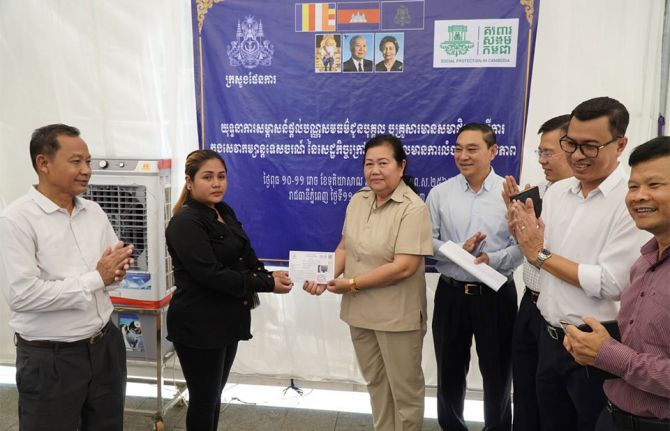

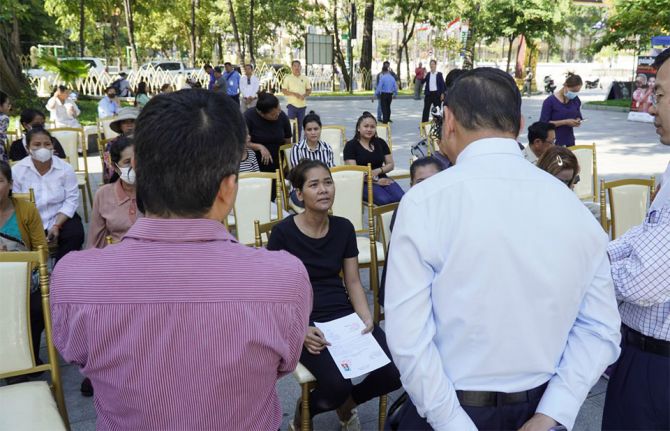
Feature Story
Cambodia social protection for people living with HIV
15 December 2023
15 December 2023 15 December 2023Imagine this: you’re a person living with HIV, and your household is facing financial hardship. You decide to run a small grocery business at home, keeping your status hidden. Despite accessing free HIV treatment, you cannot afford other essential health services. And when you need to buy medicine, you don't have enough for your children’s school supplies or nutritious meals.
Low incomes.
Unaffordable healthcare.
Employment insecurity due to HIV-related stigma and discrimination.
These realities create financial hurdles for the poor among people living with HIV and the key populations—gay men and other men who have sex with men, transgender women, sex workers and people who inject drugs.
In Cambodia, stakeholders are working to ensure that the social protection safety net specifically covers people living with, and at risk of contracting, HIV.
“People living with HIV do not only need medication, but also food. If we provide only the drugs they will not survive,” said Tia Phalla, Deputy Director of Cambodia’s National AIDS Authority (NAA). He explained that nutrition support and other non-health related care are an integral part of the national policy for responding to HIV.
Cambodia is among the countries that are on-track to reach the 2025 Global AIDS Strategy testing and treatment targets. As of the end of 2022, an estimated 86% of people living with HIV in Cambodia were aware of their status. Impressively, more than 98% of diagnosed people were receiving treatment and 98% of those on treatment achieved a suppressed viral load last year.
The country hopes to further improve these results while enhancing the quality of life of people living with HIV.
“A key part of the strategy we have advocated for is to include HIV sensitivity in social protection schemes and programmes,” explained Patricia Ongpin, UNAIDS Country Director for Cambodia, Lao PDR and Malaysia. Individuals and families affected by HIV can now benefit from a range of programmes including cash transfer, food assistance, social health protection and scholarships.
Once a person living with HIV registers their household for an Equity Card, they are entitled to monthly stipends. The card also gives holders access to additional medical care. This frees individuals and families from having to choose between healthcare and expenses for other essentials such as education and food.
In 2019 Cambodia officially included people living with HIV in its IDPoor mechanism. This is a system to identify and register households living in poverty. This was followed by the HIV and Social Protection Assessment, conducted in 2020 by UNAIDS and the NAA.
“The assessment made it clear that promoting HIV-sensitive social protection could help reduce the risk of HIV, increase demand for HIV prevention services, and promote HIV testing and safe sexual behaviors, as well as adherence to treatment,” said Ms Ongpin.
To ensure a more inclusive approach for IDPoor registration there must be engagement from key stakeholders including government, local authorities, development partners, and civil society organizations.
With support from UNAIDS and UNDP, Cambodia’s Ministry of Planning launched a web-based system and mobile application for IDPoor registration in December 2022. This approach makes it easier for individuals living with HIV to register at their treatment centers. As of August this year, more than 13,600 people living with HIV have been enrolled.
By leveraging this technology-driven approach, people living with HIV feel confident revealing their HIV status and are empowered to access much-needed healthcare benefits with dignity and autonomy. The solution can also be used to register people from key population communities at risk of contracting HIV.
Community leadership is a key strategy for expanding the initiative’s reach. The Joint Forum of Networks of People Living with HIV and key populations (DFoNPAM) coordinates with the Department of Planning at district level in order to help with IDPoor registration.
One initiative specifically targeted female entertainment workers. A national registration campaign was co-organized by the Ministry of Planning, the Phnom Penh City Hall, and the NAA, with technical assistance from UNAIDS. Around five dozen workers registered during the two-day campaign, receiving Equity Cards for their households.
According to the UNAIDS Country Director, this inclusive approach is key to creating a better future for people living with HIV and key populations.
“To mobilize their participation and register them for Equity Cards, we need to understand the barriers. And to understand the barriers, we need to listen to their experiences, in their own words. By taking this step, people living with HIV and key populations can help shape the conversation and ensure that their voices are heard,” Ms Ongpin ended.
Region/country
Related

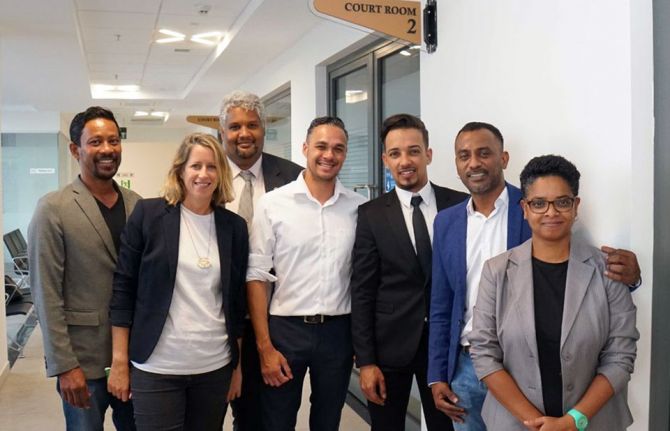
Press Statement
The United Nations welcomes the Supreme Court’s decision to decriminalize same sex relations in Mauritius
04 October 2023 04 October 2023This will speed up progress to end the AIDS pandemic and save lives.
GENEVA, 4 October 2023—The United Nations in Mauritius—which includes UNAIDS, UNFPA, OHCHR, UNDP and WHO—welcome today’s ruling by the Supreme Court of Mauritius that a discriminatory law criminalizing consensual same sex relations is unconstitutional and will be immediately struck from the legal code. Previously, under Section 250 of the Mauritian Criminal Code (which dated back to 1898) anyone convicted could have faced up to five years in prison.
“The Supreme Court today overturned an obsolete colonial law and demonstrated its commitment to non-discrimination and leaving no-one behind,” said Lisa Singh, United Nations Resident Coordinator in Mauritius. “The UN in Mauritius and internationally welcomes the decision of Mauritius to join the growing list of African countries protecting the human rights of everyone, including LGBTQI+ people.”
The ruling noted that “Section 250 was not introduced in Mauritius to reflect any indigenous Mauritian values but was inherited as part of our colonial history from Britain. Its enactment was not the expression of domestic democratic will, but was a course imposed on Mauritius and other colonies by British rule.” It also noted that a growing number of countries have decriminalized consensual same sex sexual relations, including the United Kingdom which overturned its law in 1967.
“Mauritius' decision to decriminalize homosexuality is an important step forward for public health and a step towards equal rights, respect and dignity for the LGBTQI community,” said Anne Githuku-Shongwe, Director of UNAIDS’ Regional Support Team for Eastern and Southern Africa. “UNAIDS applauds Mauritius for today’s decision which will mean that men who have sex with men will have much easier access to the health and social services they need without fear of arrest or criminalization. Work will need to continue to break down the barriers of stigma and discrimination towards the LGBTQI community, but today’s ruling is a positive step in the right direction. It will save lives.”
Mauritius becomes the latest in a growing list of countries to declare that laws which have criminalized LGBTQI people are unconstitutional. However, UNAIDS estimates that 66 countries still have laws which criminalize consensual same sex relations. In addition to contravening the human rights of LGBTQI people, these laws impede access to health and social services, including HIV services. Such laws fuel stigma and discrimination against LGBTQI people and put them under constant fear of being punished or detained.
The case was brought forward by Abdool Ridwan Firaas Ah Seek, President of Arc-en-Ciel, the largest and longest-standing organisation in Mauritius championing the human rights of LGBTQI people, and was supported by partners including the Human Dignity Trust.
Civil society organizations, especially community-led organizations, are at the forefront of a global wave of progress that advances access to health for all. UNAIDS urges all countries to decriminalise same sex sexual relations. Decriminalization saves and changes lives.
Maneesh Gobin, Attorney General and Minister of Foreign Affairs and Regional Integration in Mauritius said, “In keeping with its internationally acclaimed respect for the rule of law, Mauritius will indeed report to United Nations Member States at the next cycle of the Universal Periodic Review.” The Universal Periodic Review is a unique mechanism of the Human Rights Council that calls for each UN Member State to undergo a peer review of its human rights records every 4.5 years.
UNAIDS
The Joint United Nations Programme on HIV/AIDS (UNAIDS) leads and inspires the world to achieve its shared vision of zero new HIV infections, zero discrimination and zero AIDS-related deaths. UNAIDS unites the efforts of 11 UN organizations—UNHCR, UNICEF, WFP, UNDP, UNFPA, UNODC, UN Women, ILO, UNESCO, WHO and the World Bank—and works closely with global and national partners towards ending the AIDS epidemic by 2030 as part of the Sustainable Development Goals. Learn more at unaids.org and connect with us on Facebook, Twitter, Instagram and YouTube.
Our work
Learn more
Region/country

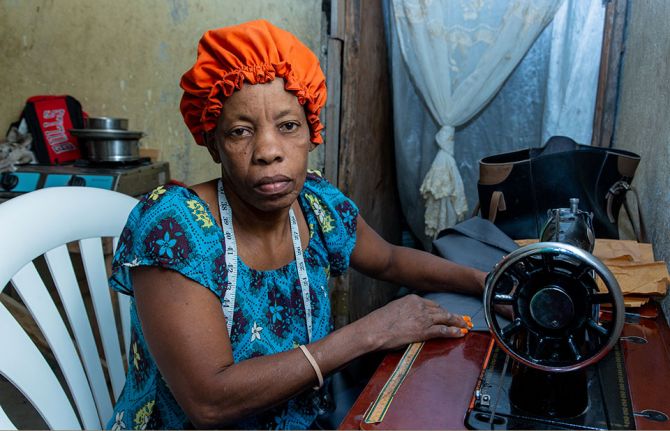
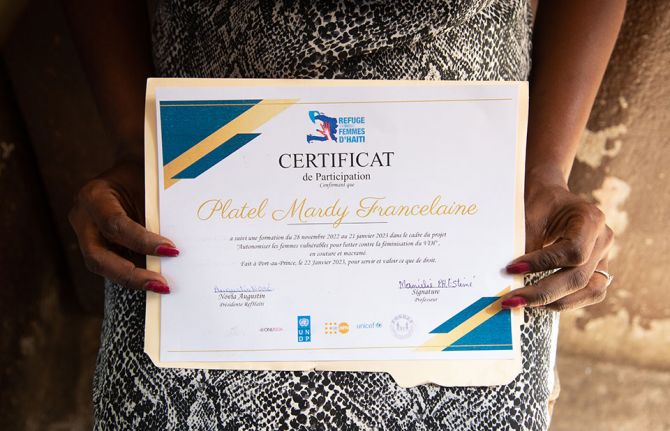
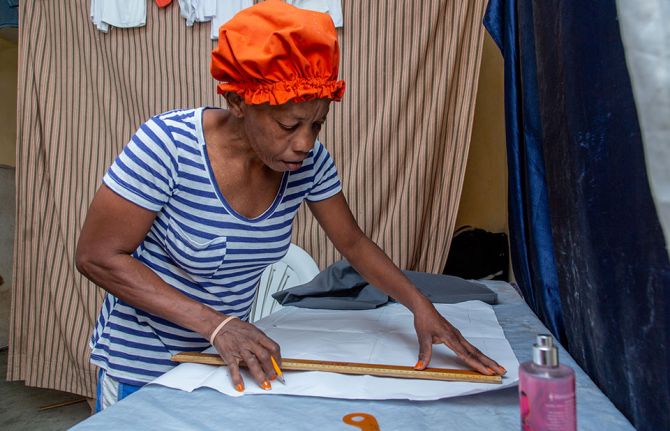
Feature Story
Supporting women and girls affected by gang violence in Haiti
29 June 2023
29 June 2023 29 June 2023At Refuge des Femmes d'Haiti, a small women's community-based organization in the commune of Croix-des-Bouquets, Port-au-Prince, Martha Norcimè, a 34-year-old pregnant woman from the nearby commune of Delmas, completes her training in sewing and macramé—a form of textile produced using knotting techniques.
She is part of a group of vulnerable women deeply affected by the gang violence and warfare that has impacted several areas of the capital since early 2022. Most of her peers came from Croix-de-Bouquets. All of them—including women with HIV—living in challenging circumstances, who have seen their livelihood completely disappear throughout these past two years as violence rose.
"I will soon give birth to my first child. I used to sell food and cleaning products that I was buying on the Haitian-Dominican border between Jimani and Malpasse, and I was then selling in markets in the city and in my neighborhood,” recalls Martha. “But I could no longer continue, given the blockade of the North city entry controlled by armed gangs. So many women traders are raped, kidnapped, or robbed by them."
In the fall of 2022, a joint UN project coordinated by the UNAIDS Country Office in Haiti, with participation from UNFPA, UNDP, and UNICEF, has been launched in partnership with Refuge des Femmes d’Haiti and with the support of FOSREF, a Haitian non-governmental organization. The goal is to support women and girls living this daily reality by empowering and giving them the tools to remain healthy and overcome the feminization of HIV in Haiti.
Haiti’s significant gains made over the past decade in controlling its HIV epidemic are now under threat, particularly in the capital, where a third of the 11.8 million Haitians reside. The brunt of an ongoing socio-economic and security crisis triggered by the assassination of former President Jovenel Moïse in July 2021 is borne by adolescent girls, young and adult women.
The feminization of HIV has long been a feature of the Haiti pandemic with HIV prevalence for females at 2.3%, compared to 1.6% among men. Still, the continuing multi-faced and profound crisis, fueled by such levels of violence, is exposing thousands of women to HIV infection.
In October 2022, a joint human rights report published by the United Nations Integrated Office in Haiti (BINUH) and the Office of the United Nations High Commissioner for Human Rights (OHCHR), entitled Sexual violence in Port-au-Prince: a weapon used by gangs to instill fear denounced collective rape by gangs in the capital as a weapon of war. In May 2023, research conducted by the Global Initiative Against Transnational Organized Crime in Cité-Soleil, another impoverished commune in Port-au-Prince deeply hit by gang activity, found that 80% of the women and girls who participated in the study had been victims of one or more forms of gender-based violence by one or multiple perpetrators.
"We work closely with UN Agencies to support women, victims of violence, make them financially independent and thus reduce the feminization of HIV, sexual and gender-based violence and maternal and neonatal mortality," says Novia Augustin, President of Ref-Haiti, and of the Federation of Women Organizations for the Equality and Human Rights (FEDOFEDH). "Difficulties are several, but the biggest is insecurity and the lack of financial resources. My motivation comes from our results: When I look at the satisfaction on the faces of the women we have accompanied, the recognition they show, I tell myself that it is worth it, despite all the difficulties encountered and the risks incurred."
Martha recalls how Novia opened the door to her for intensive training every day from 8 a.m. to 4 p.m. At the time, she was already pregnant. And despite the pregnancy-related fatigue, she did not miss a single day of class. “I can sew skirts, bonnets, blouses and even sandals!" she says proudly. "But I can't do anything now because of this crisis. Sometimes I even miss my pre-natal appointments with the doctor just because I am afraid to go out."
Besides training, Ref-Haiti also included discussions on HIV risk and prevention, gender-based violence, sexual and reproductive health, family planning, and cholera. The awareness-raising activities targeted women beneficiaries and hundreds of young girls of other affected communes.
"We are working to support an integrated health response for women and girls so severely affected by gang violence and by socio-economic inequality”, says Christian Mouala, UNAIDS Country Director for Haiti. “We are proud of women-led local organizations such as Refuge des Femmes and their immeasurable efforts to support women to overcome the challenges they face."
All photos by UNDP Haiti
Region/country
Related

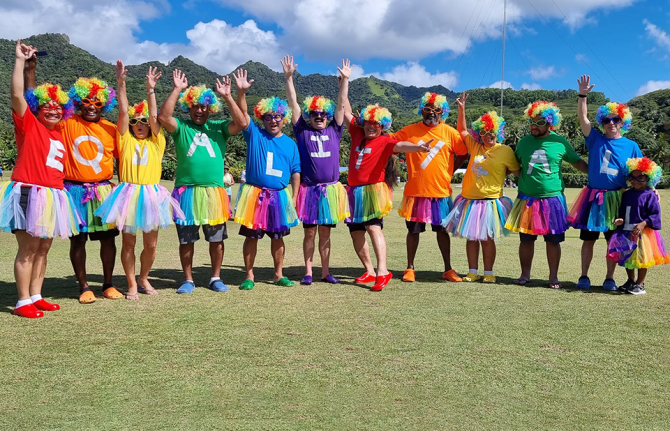
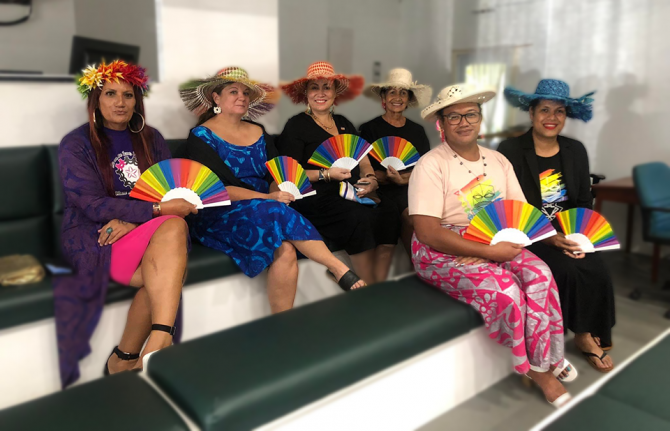
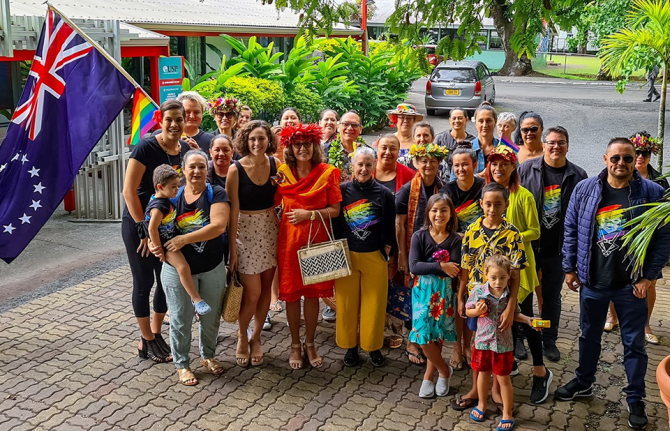
Feature Story
Cook Islands’ original path toward equality
27 April 2023
27 April 2023 27 April 2023On April 14th members of the Cook Islands rainbow community assembled at parliament with colourful flags and cautious optimism. It turned out to be the day they’d been working toward for the last twelve years. Parliament removed laws prohibiting consensual sex between men, striking out sections of the Crimes Act that had been on the books since the turn of the 20th century.
“This decision by Cook Islands is part of a wave of global progress around abolishing harmful laws,” noted UNAIDS Asia Pacific Regional Director, Eamonn Murphy.
“This was a huge historical moment,” said Valery Wichman, President of the Te Tiare Association, the nation’s oldest lesbian, gay, bisexual and transgender (LGBT) organisation. “It’s not just a win for the community, but also a shift in terms of our nation maturing and upholding the constitutional rights of all people.”
Ms Wichman, an attorney and public servant, is also an akava'ine—a Māori word meaning transgender woman. She attests that the anti-LGBT laws which made so-called “sodomy” and “indecent acts” punishable by imprisonment reinforced prejudices. This contributed to the LGBT community’s exclusion, harassment and bullying. She has herself experienced being mocked and assaulted.
“A lot of people chose not to live here. It was too hard for them to endure their family’s and society’s judgment. The idea that you are not worthy has carried down from parents to children and has affected how we have been treated by our peers. A lot of trans women have not gone to the doctor because they have been misgendered and have felt disrespected. There have been cases where they ended up dying,” she said.
The journey toward law reform started in 2011. The spark was the discriminatory response to the nation’s first HIV diagnosis. Te Tiare led the advocacy charge with support from organisations including the Cook Islands Family Welfare Association.
A Crimes Bill drafted around 2013 removed the discriminatory clauses. In 2017 parliament set up a Standing Committee to review its raft of proposed revisions. Support for civil society to prepare submissions outlining public health grounds for reforms was provided by the United Nations Development Programme (UNDP), the lead agency amongst the United Nations Joint Programme on HIV and AIDS working on effective democratic governance and issues affecting sexual and gender minorities.
But following a political change the next year, the committee’s Chair recommended retaining the ban on gay sex. What’s more, he proposed a new section criminalising sex between women. The bill remained in limbo for years. Reform efforts seemed to hit a wall.
A strategy of public dialogue and political engagement rooted in Cook Islands culture enabled a breakthrough. Pride Cook Islands (PCI) was formed as a sister organisation to Te Tiare, focusing on this public advocacy branch of work.
“Obviously we are in a unique situation as a small, conservative, religious population,” PCI President, Karla Eggelton began. “The work of advocacy becomes more delicate when you are living beside people making these decisions for you. We welcomed support from international allies, but we knew we had to do this our own way and have our own approach that is mindful of the situation and culture we live in.”
First TCI tackled messaging. There were deep deliberations around word choice. The mandate was to keep the conversation simple. Ultimately the cause was framed as an equality issue. The rallying cry became, ‘don’t make us criminals in our own country’.
The organisation stayed in communication with policymakers on both sides of aisle. They not only explained their position, but sought to understand politicians’ concerns.
The group met with traditional leaders who are grassroots decision-makers. Village communities were invited to have conversations during public meetings.
“It offered an opportunity for us to understand the misperceptions. We were able to explain that all we are asking for is to not be made criminals. People said, ‘we don’t want to send you to jail, we love our neighbours and our family’,” Ms Eggelton remembered.
The organisation’s patron is Lady Tuaine Marsters whose husband, Sir Tom Marsters, is the British King’s Representative. Lady Marsters frequently attended consultations. Other spokespersons included parents and people with standing in the church. At times supporters were invited to simply stand in solidarity. But anyone who would speak was carefully prepared.
“We spent hours articulating what we would say. We reaffirmed our pledge to not become emotional. We had to keep each other in check to make sure we did not say anything we could regret,” Ms Eggelton outlined.
Then came an effort to increase visibility. The call for equality was largely coming from the LGBT community. They needed other people to demand the same. So PCI embarked on a campaign for people to show their support either by lending their voice to the public dialogue or flying the rainbow flag. The group distributed free flags, urging people to fly one for their daughter, son or grandchild. From restaurants to bars, t-shirts to earrings, the display of support resonated.
A first-of-its-kind pride ad on TV, newspapers and radio challenged Cook Islanders: “We are good enough to be your teachers, nurses, choreographers, dressmakers and orators… but not good enough in the eyes of the law. We are already part of your community, we are just asking you to recognise us as equals.”
This visibility and advocacy work was supported by UNDP through the Being LGBTI in Asia and the Pacific program. PCI developed a project to strengthen the digital capacities of community organisations. A critical outcome was the Pride Pledge Cook Islands initiative with the business community which provides visible safe spaces for LGBT people.
“The UNDP support was instrumental in promoting acceptance and awareness and utilising digital tools to share our message,” Ms Eggelton said.
TCI conducted frequent polls to gauge public sentiment. At the start of the process they lagged behind reform opponents. But by the time would-be Prime Minister, Mark Brown, made an election promise to change the law last year, public sentiment had tilted.
“Once we were able to establish that it was really about equality, then we saw a changing of the tide,” Ms Eggelton reflected.
Ultimately the entire government bench voted in favour of an Amendment Bill while opposition leader, Tina Brown, and two of her Members of Parliament also supported.
Renata Ram, UNAIDS Country Director for Fiji and the Pacific, noted that seven other countries in the Pacific region retain laws criminalising same-sex relations.
“The Cook Islands example proves that along with law reform we can have national dialogues about inclusion, justice and equity,” Ms Ram said.
At a national ceremony marking the end of the South Pacific cyclone season the rainbow community gathered once more, this time to give thanks.
“We want to make sure people understand our gratitude for everything that has transpired and for everyone who worked hard to achieve this,” Ms. Eggelton said. “Our community is now recognised through the eyes of the law as being equal. Now people can feel safe, not like second class citizens.”
Our work
Region/country
Related
 Status of HIV Programmes in Indonesia
Status of HIV Programmes in Indonesia

24 February 2025

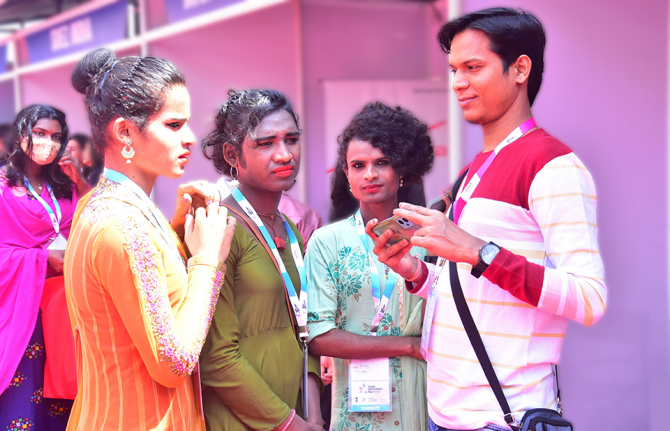
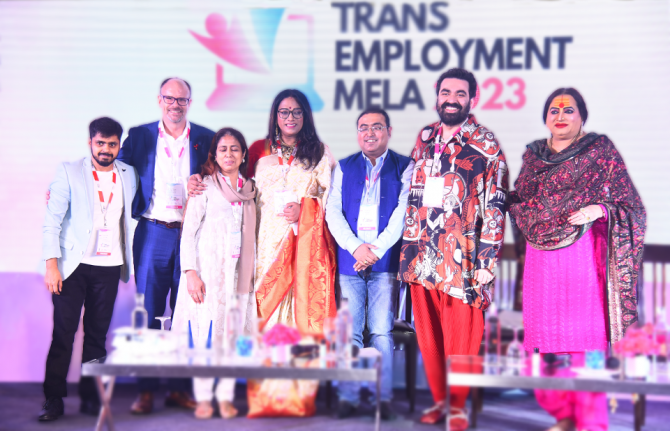

Feature Story
Beyond transgender visibility: India works toward employment equity
31 March 2023
31 March 2023 31 March 2023Ratrish Saha is a transgender woman from Kolkata, India. Even with seven years’ work experience, she was anxious about applying for a new job last year.
“Finding a job is never easy being a transgender woman. I would get rejected with statements like ‘currently no LGBT hiring is going on’ or ‘we do not have facilities to accommodate a trans individual in our office’,” she recalled. But through the Transgender Welfare Equity and Empowerment Trust or TWEET Foundation, she was paired with suitable opportunities in corporations that have received sensitivity training. She soon landed the position of associate consultant for Siemens Technology in Bangalore.
She said of the interview process: “I only talked about my skills and no gender explanations were included in those conversations.” An ecstatic Ms. Saha says she is “grabbing the opportunity… putting my all into it”.
Transgender people in India now have a new pathway toward dignified work thanks to a collaborative effort between communities, government and development partners.
Ahead of the International Day of Transgender Visibility, the UNAIDS Country Office for India and United Nations Development Programme (UNDP) supported the Trans Employment Mela (Job Fair) in New Delhi. The initiative was jointly hosted by the National Institute of Social Defence, Ministry of Social Justice and Empowerment, TWEET Foundation and In Harmony, a diversity consulting firm.
The programme aims to accelerate the socio-economic inclusion of the trans community by bringing awareness about their issues to mainstream corporations and providing a platform to connect them with job roles in inclusive organisations.
“Not only does this approach provide an opportunity for dialogue between government representatives, civil society organisations, and businesses, but it facilitates access to skills training, career counselling, entrepreneurship support and mentorship support,” Maya Awasthi, Co-Chair and Co-founder of TWEET Foundation explained.
India’s 2019 Transgender Persons (Protection of Rights) Act prohibits employment discrimination against trans people in either the public or private sectors. While stakeholders point to aspects of the law that could be strengthened, they acknowledge that the wide-ranging anti-discrimination provision creates a pathway toward building a more inclusive culture and pursuing redress when rights are violated.
Addressing employment access inequality is relevant to the HIV response. In 2021 HIV prevalence among transgender people in India was 3.8%, almost 20 times the national average. A study commissioned by India’s National Human Rights Commission found that in 2017 just six percent of transgender people were formally employed in either the private or non-governmental organisation (NGO) sector. About 5% engaged in sex work and domestic labour respectively. Thirteen percent sold food and other items while 11% reported begging.
“There are many ways in which higher paying and consistent work can reduce HIV vulnerability,” explained UNAIDS Country Director for India, David Bridger. “By addressing the inequalities that have unfairly pushed trans people away from opportunities, we can help build a more empowered community in which people fulfil their potential, enjoying better health and wellbeing in the process.”
The 2017 Human Rights Commission study found that around half the transgender population never attended school. Several development partners are supporting initiatives to provide the community with education opportunities in a stigma-free environment as well as skills training to promote self-reliance.
Aarav Singh is a transman who had been out of work for six months. He was able to score a human resource internship at Roop Automotives through the Trans Employment Mela.
“This is a sensitised, trans inclusive organisation where I've faced zero issues with documentation. Not only me but my friends have scored great opportunities with some of the leading trans inclusive companies,” he said. “I hope this continues.”
But while the Trans Employment Mela beneficiaries acknowledge the community dimension of their challenge, in other respects they feel like any other hopeful young professional or recent graduate.
Yumnam Thawalngamba Meetei completed an MBA in 2022 but found it difficult to get a management position “or even a small job”.
“With the help of TWEET Foundation I got into Mahindra Logistics Limited as an Executive for Talent Management and Organisational Development in Mumbai. I am thankful for this job to pave a path for my success,” he said.
Region/country
Related
 Status of HIV Programmes in Indonesia
Status of HIV Programmes in Indonesia

24 February 2025

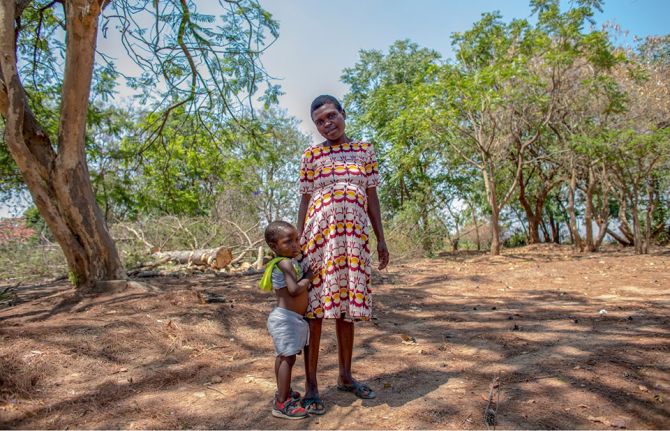
Press Statement
UNAIDS welcomes parliament’s decision to repeal the law that criminalizes HIV transmission in Zimbabwe
18 March 2022 18 March 2022GENEVA, 18 March 2022—UNAIDS congratulates Zimbabwe’s parliament for repealing section 79 of the Criminal Law Code, which criminalizes HIV transmission. A new marriage bill adopted by parliament that repeals the criminal code section is to be signed into law by the president. The criminalization of HIV transmission is ineffective, discriminatory and undermines efforts to reduce new HIV infections. Such laws actively discourage people from getting tested for HIV and from being referred to the appropriate treatment and prevention services.
“Public health goals are not served by denying people their individual rights and I commend Zimbabwe for taking this hugely important step,” said UNAIDS Executive Director, Winnie Byanyima. “This decision strengthens the HIV response in Zimbabwe by reducing the stigma and discrimination that too often prevents vulnerable groups of people from receiving HIV prevention, care and treatment services.”
UNAIDS has worked closely with Zimbabwe’s National AIDS Council, Zimbabwe Lawyers for Human Rights, parliamentarians, civil society activists and communities to advocate for the repeal of the law criminalizing HIV. Overly broad and inappropriate application of criminal law against people living with HIV remains a serious concern across the globe. More than 130 countries worldwide still criminalize HIV non-disclosure, exposure and transmission through either specific or general criminal legislation.
In 2019, Zimbabwe completed a legal environment assessment, which identified the criminalization of HIV transmission as a barrier to health care and a driver of stigma and discrimination for people living with HIV and other key populations. Since then, the United Nations Development Programme has worked with key populations and other stakeholders, convening meetings with parliamentarians and other partners to advance the recommendations of the legal environment assessment.
In 2018, UNAIDS, the International Association of Providers of AIDS Care and the International AIDS Society convened an expert group of scientists who developed an Expert Consensus Statement on the Science of HIV in the Context of Criminal Law. The statement calls on the criminal justice system to ensure that science informs the application of the law in criminal cases related to HIV.
Zimbabwe has made great progress in the response to HIV over the past decade. It is estimated that 1.2 million of the 1.3 million people living with HIV in the country are now on life-saving medicines. AIDS-related deaths have decreased by 63% since 2010, with new HIV infections down by 66% over the same period.
UNAIDS
The Joint United Nations Programme on HIV/AIDS (UNAIDS) leads and inspires the world to achieve its shared vision of zero new HIV infections, zero discrimination and zero AIDS-related deaths. UNAIDS unites the efforts of 11 UN organizations—UNHCR, UNICEF, WFP, UNDP, UNFPA, UNODC, UN Women, ILO, UNESCO, WHO and the World Bank—and works closely with global and national partners towards ending the AIDS epidemic by 2030 as part of the Sustainable Development Goals. Learn more at unaids.org and connect with us on Facebook, Twitter, Instagram and YouTube.
Our work
Region/country

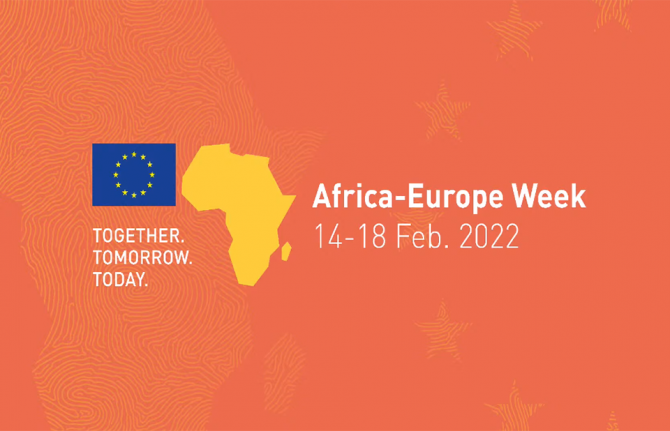
Feature Story
Investments in HIV, health and pandemics are vital for economic recovery in Africa
15 February 2022
15 February 2022 15 February 2022Global health and financing leaders and experts have come together at a high-level virtual event to tackle one of the most pressing issues facing the world today—health security. The event, “Investing in health is investing in economic recovery: Financing for HIV, stronger public health systems, and pandemic preparedness and response” was held ahead of the sixth Africa - European Union (EU) Summit which is taking place on 17 and 18 February.
While hosting 16% of the global population, and facing 26% of the global disease burden, Africa accounts for only 2% of global health spending. Despite the 2001 Abuja Commitment of governments to allocate 15% of their budget to health, the average is still only 7%.
Speakers discussed how Africa has been left behind in the COVID-19 response, with less than 12% of people in Africa fully vaccinated against COVID-19. Insufficient access to vaccines, medicines and technologies, and weak health systems have impeded the realization of the right to health of all Africans during the pandemic. In addition, fiscal constraints and unsustainable debt burdens, are hindering the path to recovery.
Cosponsored by the Government of France, the event was convened by UNAIDS, the African Union, the Global Fund to Fight AIDS, Tuberculosis and Malaria, the World Bank, the United Nations Development Programme, and the World Health Organization. Moderated by Dr. Donald Kaberuka, High Representative for Financing, African Union (AU), the session strived to find ways of broadening the revenue base available to African countries to increase health financing and to boost global solidarity.
Participants underlined the overarching need for investment in strengthened public health systems for universal healthcare, including community-led services, and avoiding overburdening the most vulnerable with out-of-pocket expenses to overcome the COVID-19 crisis. Further, tackling the current pandemics of HIV and COVID-19, and other infectious diseases such as malaria and TB, must happen simultaneously to prevent future pandemics and protect global health security.
"If we continue as we are - if we do not take the steps necessary to speed access and close inequalities in the HIV response - the world could face 7.7 million AIDS deaths over the next ten years - 4.7 million of those deaths would be in Africa"
Leaders stressed how essential HIV, health systems and pandemics preparedness investments are to save human lives and for economic recovery, and how there will be no steep recovery for Africa without health security for all.
“Less than half of health clinics in Africa have water and electricity. We have to do more, we know where the funding gap is: investments in health, human resources and infrastructure"
Tackling existing pandemics, such as COVID and HIV, needs to happen at the same time as countries strengthen health systems and build up pandemic preparedness.
“Diseases are not a choice, but pandemics are a choice that we could choose to avoid. Ultimately the key to sustainably protecting everybody from the deadliest infectious diseases is through domestic financing"
Participants praised the increased African leadership and sovereignty and called for a renewed Africa-EU partnership that would support African institutions and rely on its leadership, in collaboration with multilateral institutions. Specifically, they called on the EU to further dedicate financing mechanisms for HIV, health and pandemic preparedness, including sustained and increased overseas development assistance (ODA).
“Investing in health is a political decision. Africa's youth can be its greatest asset. Quality healthcare is the foundation upon which Africa's youth will flourish. We can no longer treat healthcare spending as an afterthought”
The panel members also recognized the importance of domestic financing for long-term sustainability. However, the current financial constraints are overwhelming for many countries in the region. Decisive action to eradicate tax evasion and tax dodging will be critical: every year between 25 and 50 billion that could be used for the health and education of Africans are lost. Increasing domestic revenues requires brave international and national tax reforms. Possible ways forward discussed for broadening the revenue base included combating tax evasion, improving the conditions under which African countries obtain financing, debt relief and cancellation policies, and Special Drawing Rights reallocation.
“The pathway to achieving global health security for humanity is to strengthen African support to achieve health sovereignty”
Speakers highlighted that a growing share of revenue allocation, as well as better investment and the use of health and pandemics´ resources are urgently needed, leveraging the AIDS infrastructure and lessons learned from the rights-based AIDS response to prevent future pandemics.
“The COVID-19 pandemic has created a tragic opportunity to revise thinking fundamentally, strengthen health systems effectively, and reshape resource mobilization in health, including domestic investment"
The leaders called for robust international financing, through special drawing rights reallocation, debt relief, new concessional sources and additional ODA. They identified The Global Fund replenishment in 2022 as a key moment to ensure overarching support for the fight against AIDS, malaria and TB, to get back on track.

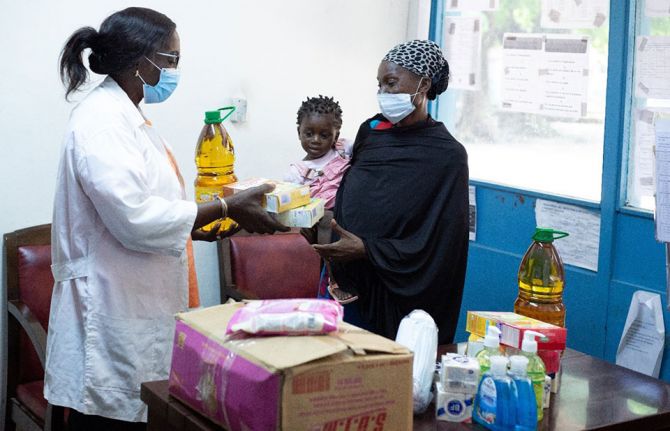
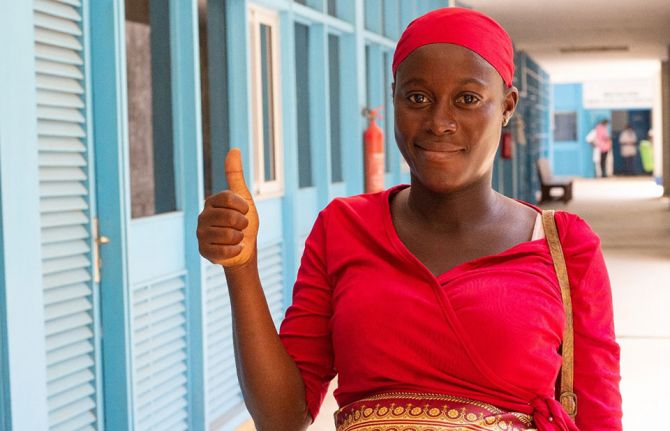
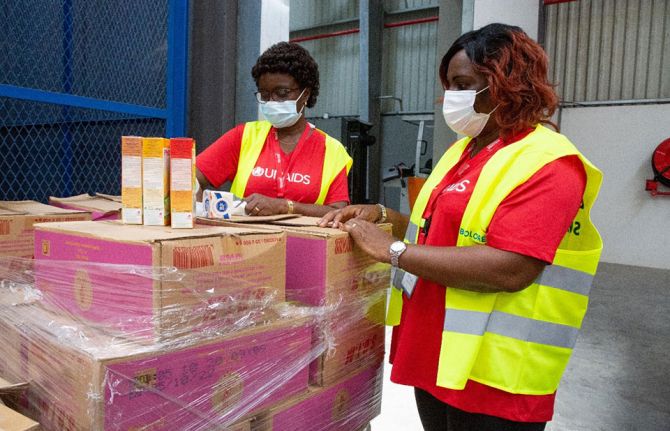
Feature Story
UNDP and UNAIDS support more than 300 pregnant and breastfeeding women living with HIV in Abidjan
08 July 2021
08 July 2021 08 July 2021Like the rest of the world, COVID-19 has hit Côte d’Ivoire hard. As soon as the first cases of COVID-19 were confirmed in March 2020, a national response plan was developed by the government. Unfortunately, the restrictive measures to protect the population had an impact on the use of health services, including those related to HIV, threatening the fragile retention in care of people living with HIV. Pregnant and lactating women living with HIV and their children, one of the most vulnerable groups, have been particularly affected, and maintaining their access to services and care was essential to avoid undoing years of effort.
The United Nations Development Programme (UNDP) and UNAIDS joined forces to help retain 333 pregnant and lactating women living with HIV in antenatal, maternity and paediatric services in Abidjan. The project will provide, over nine months, 1000 food kits and 1000 hygiene kits to help beneficiaries with food assistance and help them protect themselves against COVID-19. A food kit contains 20 kg of rice, six litres of oil, 10 pieces of soap and four boxes of children’s flour, and a hygiene kit contains two bottles of hydroalcoholic gel, two bottles of liquid soap and 50 surgical masks. The project also aimed to ensure that the women have access to the comprehensive package of services developed under Côte d’Ivoire’s prevention of mother-to-child transmission of HIV (vertical transmission) programme, to ensure that all exposed children of the project’s beneficiaries are screened early and have access to appropriate care and to document and share good practices.
One of the beneficiaries, Ouattara Maimouna, who has been living with HIV for five years and is a breastfeeding mother of three children, said, “Doctor, this gift was incredibly important to us. It has helped us a lot! This stock of food helps me feed my family. I cannot thank you enough, because I ran out of ways to sustain the small business that used to support my family.”
“About 700 hygiene kits and 700 food kits have been distributed since the project started in December 2020. The United States President’s Emergency Plan for AIDS Relief’s (PEPFAR) implementing partners unanimously indicate that the kits have contributed to the loyalty of pregnant and breastfeeding women to prevention of vertical transmission of HIV and paediatric care services, as well as to self-support groups,” said Brigitte Quenum, the UNAIDS Country Director for Côte d’Ivoire.
At this stage of implementation, some lessons learned are already emerging. The project has been very well received by the beneficiaries because of their vulnerability, which has been aggravated by the COVID-19 crisis. The support has helped to increase their compliance with appointments at the various prenatal consultations, to improve the continuity of treatment and viral load testing for pregnant and breastfeeding women and to strengthen the link between women living with HIV and the staff providing both clinical and community care. The project also emphasizes the importance of taking into account the social component in the care of women in prevention of vertical transmission of HIV services.
The distribution of food and hygiene kits will continue until the end of 2021. Pregnant and breastfeeding women living with HIV have become more vulnerable in the midst of the response to COVID-19 and assistance strategies that respond to their specific sensitivities must be designed. “The mobilization of UNDP, UNAIDS, PEPFAR implementing partners and their nongovernmental organization partners has ensured a coalition of support for advocacy and the scaling up of outreach efforts to vulnerable populations,” added Ms Quenum. “While this one-time initiative is useful, efforts should be made to integrate other activities, such as nutrition promotion and the integration of a social component in the care of women living with HIV in vertical transmission services and other care sites.”
An HIV-sensitive and inclusive social protection assessment will start in the coming months in collaboration with the key ministries involved. Mobilization of funds for social aspects related to women living with HIV and advocacy for sustainable support measures will be required.


